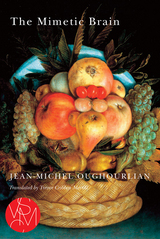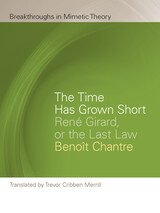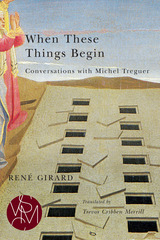3 books about Merrill, Trevor Cribben

The Mimetic Brain
Jean-Michel Oughourlian
Michigan State University Press, 2016
The discovery of mirror neurons in the 1990s led to an explosion of research and debate about the imitative capacities of the human brain. Some herald a paradigm shift on the order of DNA in biology, while others remain skeptical. In this revolutionary volume Jean- Michel Oughourlian shows how the hypotheses of René Girard can be combined with the insights of neuroscientists to shed new light on the “mimetic brain.”
Offering up clinical studies and a complete reevaluation of classical psychiatry, Oughourlian explores the interaction among reason, emotions, and imitation and reveals that rivalry—the blind spot in contemporary neuroscientific understandings of imitation—is a misunderstood driving force behind mental illness. Oughourlian’s analyses shake the very foundations of psychiatry as we know it and open up new avenues for both theoretical research and clinical practice.
Offering up clinical studies and a complete reevaluation of classical psychiatry, Oughourlian explores the interaction among reason, emotions, and imitation and reveals that rivalry—the blind spot in contemporary neuroscientific understandings of imitation—is a misunderstood driving force behind mental illness. Oughourlian’s analyses shake the very foundations of psychiatry as we know it and open up new avenues for both theoretical research and clinical practice.
[more]

The Time Has Grown Short
René Girard, or the Last Law
Benoît Chantre
Michigan State University Press, 2022
The protagonist of Marcel Proust’s In Search of Lost Time observes with wonder the comings and goings of the crows that roost in the belfry of the village church in Combray, his childhood home. For René Girard, one of Proust’s great interpreters, their mysterious flight, first departing from and then returning to the vertical axis of the steeple, suggests the movement of modern history—the crisis of aristocratic models, the growing servitude of individuals possessed by mimetic desire, and the final irruption of authentic transcendence. In this rich exploration of Girard’s insights, his French editor and longtime collaborator Benoît Chantre brings Saint Paul’s Letter to the Romans into dialogue with both Proust and Girard in order to push to its logical endpoint the idea of a back-and-forth movement from chaos to order. History, Chantre argues, has been driven mad by the revelation of its sacrificial engine. The only way out lies in a transformation internal to the crisis itself—only that faith which is capable of hearing the One who speaks in the Law makes it possible to avoid the perpetual ups and downs of rivalry. Acting and revealing Himself at the heart of history, an intimate model “hidden since the foundation of the world” deals a fatal blow to the circle of sin. Authentic transcendence coincides with the eschaton, the moment when—according to Saint Paul—historical time implodes into eternity.
[more]

When These Things Begin
Conversations with Michel Treguer
René Girard (Translated by Trevor Cribben Merrill)
Michigan State University Press, 2014
In this lively series of conversations with writer Michel Treguer, René Girard revisits the major concepts of mimetic theory and explores science, democracy, and the nature of God and freedom. Girard affirms that “our unprecedented present is incomprehensible without Christianity.” Globalization has unified the world, yet civil war and terrorism persist despite free trade and economic growth. Because of mimetic desire and the rivalry it generates, asserts Girard, “whether we’re talking about marriage, friendship, professional relationships, issues with neighbors or matters of national unity, human relations are always under threat.” Literary masters including Marivaux, Dostoevsky, and Joyce understood this, as did archaic religion, which warded off violence with blood sacrifice. Christianity brought a new understanding of sacrifice, giving rise not only to modern rationality and science but also to a fragile system that is, in Girard’s words, “always teetering between a new golden age and a destructive apocalypse.” Treguer, a skeptic of mimetic theory, wonders: “Is what he’s telling me true...or is it just a nice story, a way of looking at things?” In response, Girard makes a compelling case for his theory.
[more]
READERS
Browse our collection.
PUBLISHERS
See BiblioVault's publisher services.
STUDENT SERVICES
Files for college accessibility offices.
UChicago Accessibility Resources
home | accessibility | search | about | contact us
BiblioVault ® 2001 - 2024
The University of Chicago Press









